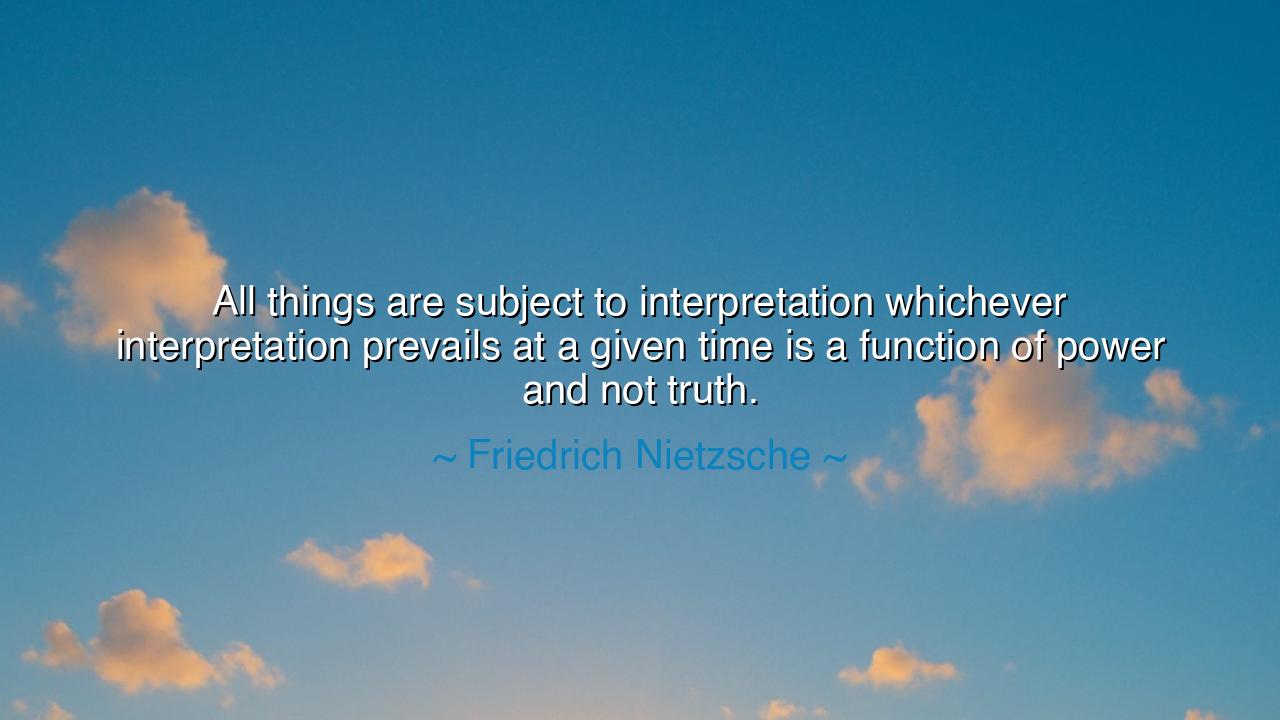
All things are subject to interpretation whichever
All things are subject to interpretation whichever interpretation prevails at a given time is a function of power and not truth.






The words of Friedrich Nietzsche, philosopher of fire and lightning, strike with unsettling force: “All things are subject to interpretation whichever interpretation prevails at a given time is a function of power and not truth.” Here he unveils one of the most haunting realities of human existence—that what we call truth is often not the pure light of reason, but the shadow cast by those who wield power. His words demand we open our eyes to see that history, morality, even reality itself, are shaped as much by the strong as by the true.
The meaning is sharp and dangerous. Every idea, every event, every act, can be clothed in many interpretations. A hero to one nation may be a villain to another; a law proclaimed as justice by rulers may be seen as tyranny by the oppressed. Which story becomes dominant rarely depends on which is closer to truth—it depends on who controls the pen, the pulpit, the throne, or the sword. Thus, power often dictates what a society calls “truth,” and the weak are left with silence or submission.
The origin of this saying is found in Nietzsche’s lifelong battle with the illusions of his age. He saw how religion, politics, and philosophy proclaimed eternal truths, when in reality they were built on the shifting sands of human desire for control. To Nietzsche, truths were not absolute monuments, but constructions—fragile, imposed, enforced by those who benefited from them. His challenge was not meant to destroy truth, but to awaken humanity to the need for vigilance: to question, to doubt, to see beyond the veil of authority.
History offers countless confirmations. Consider the Roman Empire. When Rome conquered lands, their emperors rewrote the histories, elevating themselves as bringers of civilization, even as they enslaved peoples and crushed cultures. For centuries, Roman “truth” prevailed, not because it was unassailable, but because the empire’s power enforced it. Only in later ages did voices of the conquered emerge, showing another interpretation of the same events. This is the essence of Nietzsche’s warning: history is not just the tale of what happened, but of who had the strength to decide how it would be told.
The deeper teaching is sobering. If truth itself can be shaped by power, then wisdom requires discernment. We must not take the dominant story at face value, for it may be the mask of conquest or the cloak of deceit. The ancients knew this well; the bards and prophets often stood against kings, declaring truths that power sought to silence. Nietzsche calls us to inherit their courage—to resist the illusion that what is most widely accepted must therefore be true.
The lesson for you, seeker, is to become a questioner of interpretations. When you are told a story, ask: Who benefits from this version? Who is silenced by it? Where does the power lie? Seek out the voices of the weak, for they often carry fragments of truth hidden beneath the weight of domination. Do not be content to accept truth as given; search for truth as discovered.
Practical actions follow. Read deeply and widely, not only the words of victors but of the forgotten. In your own life, when conflicts arise, remember that each side has its interpretation, and that the prevailing one may owe more to influence than accuracy. Develop courage to resist falsehoods, even when they are backed by authority. Above all, refuse to be enslaved by the truths that power imposes—forge your own path toward understanding, guided by both reason and conscience.
So remember, children of tomorrow: all things are subject to interpretation, and the loudest voice is often not the truest. Do not worship the idols of power disguised as truth. Instead, walk with vigilance, question bravely, and honor the whispers of the silenced. For it is only by resisting the tyranny of imposed interpretations that one may approach the radiance of truth itself.






AAdministratorAdministrator
Welcome, honored guests. Please leave a comment, we will respond soon